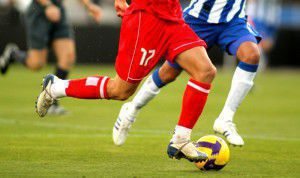10 sport stars who speak other languages
 It can often feel like life is all about sport, whether we like it or not. But have you ever wondered how good sports stars are at languages?
It can often feel like life is all about sport, whether we like it or not. But have you ever wondered how good sports stars are at languages?
It turns out, pretty good. Like anyone who has to travel a lot for their work, athletes often find knowing only their native language isn’t enough. Here are 10 great examples of sports stars who speak more than one language.
Gary Lineker
Besides English, the former footballer learnt Spanish while he was playing for Barcelona, and picked up some Japanese when he later moved to Nagoya Grampus Eight. He’s now a passionate ambassador for languages in schools, saying in an interview with TES last year, ‘the learning of languages, for me, will always be helpful for the vast majority at some stage in their life’.
Roger Federer
Not content with winning a frankly quite ridiculous 17 Grand Slam titles, the Swiss tennis player also speaks four languages fluently – his native Swiss German along with French, English and German. He’s known for his ability to switch effortlessly between languages in interviews and press conferences and can quite comfortably answer journalists’ questions in their own language, a feat some of his fellow tennis players can’t keep up with. Wouldn’t be the first time.
Tom Daley
The British diver recently got an A in his Spanish A-level (congrats, Tom!), and makes good use of his language skills when in Mexico, where he spends a lot of his time. Here’s a video of him showing off his Spanish.
Jonny Wilkinson
Here in England, Jonny Wilkinson is known (at least by me) as that guy who’s pretty good at drop goals. But he’s also a bit of a superstar in France, where he’s been playing for Toulon since 2009. He’s now fluent in French and was awarded honorary citizenship of Toulon earlier this week – giving his acceptance speech in the local language, of course.
Fernando Alonso
The Spanish Formula One racing driver speaks an impressive four languages – Spanish, Italian, English and French. And in case that’s not enough, he’s apparently working on Russian too.
Arsene Wenger
The Arsenal manager is well known for his interest in languages, speaking French, English, German, Spanish, Italian and Japanese. Like Gary Lineker, Wenger’s also known as an ambassador for languages, and last year he was voted Britain’s first Public Language Champion by readers of The Guardian. In this video he explains why languages are so important.
Novak Djokovic
Never one to let Roger take all the glory, fellow tennis champion Novak Djokovic speaks five languages – Serbian, English, German, Italian and French. He studied English and German at primary school, and learned Italian when he worked with coach Riccardo Piati. In an interview with Tennis Talk in 2013, he said, ‘We have a saying in our country: The more languages you know, the more is your worth as a person. I like to understand what people are saying wherever I am, at least to pick up a few phrases of those languages.’
Paula Radcliffe
Long-distance runner Paula Radcliffe has a first-class degree from Loughborough University in European Studies, and speaks French and German fluently. She now lives in Monaco with her husband and two children, who are both bilingual, attending a French school but also fluent in English.
Cesc Fabregas
Another Barcelona footballer, Fabregas speaks four languages – Spanish, Catalan, English and French, and his Twitter feed is multilingual. When asked about his language skills in 2005, he replied, ‘These days you have to keep studying, not least because my mum tells me so.’ Words to live by.
Daniela Hantuchova
And finally, another tennis player, because tennis is my favourite. Daniela Hantuchova, from Slovakia, is by all accounts a very talented lady. Besides her tennis career, she’s also a trained classical pianist, and speaks – wait for it – six languages: Slovak, Czech, English and German fluently, and some Croatian and Italian.
Does anyone else feel like a bit of an underachiever now, or is it just me?
If you know any other examples of sports stars who speak other languages, please tell us about them in the comments.
The EuroTalk Guide to the Winter Games 2014 [Infographic]
If you follow us on Facebook or Twitter, you’ll be aware that over the last couple of weeks, we’ve been enjoying the Winter Olympics, and we’ve been sharing our guide to the different events. Some of them were quite new to us and we had fun discovering what they were all about. So if you’ve been mystified by any of the sports, we hope this complete guide will help.

Embed This Image On Your Site (copy code below):
An Olympic Challenge
The Olympics are only a couple of weeks away and with estimated viewing figures of over four billion, and visitor numbers expected to boom, it seems the eyes of the world will shortly be focused on London.
 The stadium is ready, transport tests are being carried out and athletes are getting in their final hours of training. With 205 countries taking part, and hundreds of different first languages, how do you ensure that Rafa Nadal doesn’t end up walking bemused around the Olympic stadium rather than Wimbledon, and that Usain Bolt knows where to buy chicken nuggets before the 100m final?
The stadium is ready, transport tests are being carried out and athletes are getting in their final hours of training. With 205 countries taking part, and hundreds of different first languages, how do you ensure that Rafa Nadal doesn’t end up walking bemused around the Olympic stadium rather than Wimbledon, and that Usain Bolt knows where to buy chicken nuggets before the 100m final?
Being the largest and one of the most multicultural capitals in Western Europe does have its advantages; with 200 ethnic communities, and more than a third of its population speaking at least two of over 300 languages present within London, the Olympic organizers have spent the last two years recruiting volunteers for a vast array of opportunities to ensure the games are a success.
Adverts were posted stating the huge advantages of having a second language and this has resulted in over 1,000 volunteers being selected to man vital information points in the stadium and at major transport links. With Royalty, Presidents and VIPs arriving from all over the world, and with athletes having to be briefed, debriefed, transported and organised, the games have given language learners a great opportunity to become an integral part of the games itself.
It is no wonder then that when Nelson Mandela was asked his opinion on the games he replied, “I can’t think of a better place than London to hold an event that unites the world.”
Will you be watching the Olympics? Or are you coming to London? Maybe you’re even one of the 1,000 volunteers? We’d love to hear what you think about the games and the city.
Glyn
The Footballer’s Hidden Skills
‘Footballers are a bit dumb.’ This is a general assumption that has existed for as long as I can remember. It also makes it a little easier when you think about the vast sums of money that most get paid. However, what would happen if they suddenly stopped receiving these large weekly amounts? This may sound a little bit of an irrelevant question but this is exactly what happened to many footballers on the continent earlier this year. With arguments about television rights in Spain many of the smaller clubs from La Liga (Spain’s equivalent to the English Premier League) owed players over three month in wages. It would have been a stark realisation for many of these young players that it did not matter if you earned €100,000 a week or €100, rent and mortgages still need to be paid on time, whether you are a footballer or not.
In this case a players’ strike at the start of the season garnered support and action for many of the affected footballers. It got me thinking however, what other attributes do these players have to use in the ‘real’ world? Could a job in languages be a realistic goal?
 If you take the Premier League for instance, there are 72 different nations represented. Now remove Britain, Ireland, America and a couple of other Commonwealth countries; that leaves representatives from 64 separate countries without English as their first language. Considering that the vast majority are now bilingual this is already an impressive item to add to their CV, but if you look at a select few they could shine in a multilingual environment:
If you take the Premier League for instance, there are 72 different nations represented. Now remove Britain, Ireland, America and a couple of other Commonwealth countries; that leaves representatives from 64 separate countries without English as their first language. Considering that the vast majority are now bilingual this is already an impressive item to add to their CV, but if you look at a select few they could shine in a multilingual environment:
Thierry Henry (NY Redbulls) – 4 – English, Italian, Spanish and French
Cesc Fabregas (Barcelona) – 4 – English, French, Catalan and Spanish
Zinedine Zidane (France) – 3 – English, Spanish and French.
The most I can seem to find, however, goes to our local Fulham centre back and Swiss international Philippe Senderos, who speaks six languages (English, French, Spanish, German, Italian and Portuguese), a total that many professional linguists would struggle to contend with.
In a small attempt to dispel the notions that the British are completely monolingual I would like to mention Gary Lineker (English, Japanese and Spanish), Owen Hargreaves (English and German), David James (English and Spanish) and Sol Campbell (English and French).
The variety of languages in the English League alone can lead to problems within teams and especially within management. Chelsea is a prime example where language skills have come to the forefront of the players’ regime. With a multitude of spoken languages, the first ruling of Andre Villas Boas (the current Chelsea manager) was to state that only English was to be spoken at the club, to bring a common language to the players who would otherwise separate into groups based on their mother tongue.
With Villas speaking four languages himself, it has become an integral part of his management style. New Spanish signing Juan Mata stated that understanding the instructions in English is challenging to begin with, but the squad helps out any new team mates who are struggling. With personal problems, however, Mata says that the manager would take him to one side and have any personal conversations in Spanish to allow him to fully express himself; this demonstrates the diversity an extra language can give, especially in management roles.
There is one English based Chelsea induction that the Spaniard could not escape – the tradition of Chelsea’s karaoke initiation, where a song has to be sung in English in front of the entire squad. Mata’s choice? The Macarena… It seems that although we may not be able to write off footballers as talentless off the pitch, due to the language skills that many have learned, we may be able to continue with the assumption that they have some terrible taste.
Glyn
